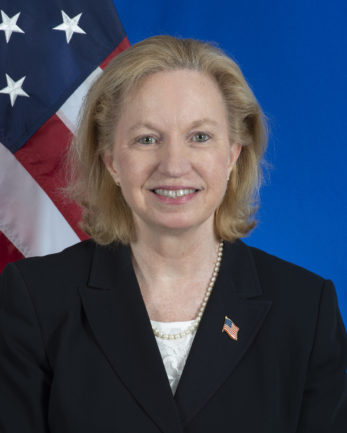While saying that political parties have to address needed reforms to avoid a repeat of the impasse that occurred after the March 2nd elections, United States Ambassador Sarah-Ann Lynch has emphasised the importance of civil society’s input in inclusive governance, which she said would be supported by Washington.
“The issue of inclusive governance is very important, I think, in Guyana. I do hope the opposition and the government come together to reduce any tensions that did exist during the elections period or that may still exist. With all that is ahead of Guyana, it is important that all voices to be heard, all Guyanese voices be heard and for all Guyanese to benefit,” Lynch told Sunday Stabroek in an interview last week.
Audio PlayerThere have been longstanding calls for inclusive governance and for constitutional reform and these intensified after the passage of a no-confidence motion that resulted in a caretaker government and during the five-month-long wait for elections results.
The US Ambassador, who was asked about the role Washington envisages playing in such a governance reform process, pointed out that it has been eight weeks since the government and opposition have been installed and “both are trying to regroup and organize themselves”. She hoped that at some point soon they “come together and discuss some of these issues that happened during the election season”.
“In order to make sure something like this does not happen again, I think it is important to review, take a look at the constitution, take a look at electoral laws and see where they can be improved in order to make sure that elections institutions are not political and it does set up the country for a successful elections where the citizens can be heard,” she said.
“It will take time. An effort like that can take some time, so I hope that the government and the opposition and small parties as well… come together soon to figure out a way forward and I hope they do so with the inclusion of civil society because citizens will play a role with any kind of inclusive governments going forward, I will make those points when I meet with the government and when I meet with the opposition as well because it is very important going forward,” she added.
A career US Foreign Service member since 1993, the Ambassador said that in her decades of serving throughout the Caribbean and world she has never experienced an election like Guyana’s where there was a five-month wait for results along with efforts at fraudulent declarations.
“I have not and I have observed elections in other places around the globe. I am a career foreign service officer. I served in many places in Asia, the Middle East, South America and the Caribbean… Honestly, I haven’t,” she said
But she pointed out that she was “very pleased and happy” to be invited to be a domestic observer and recounted the experience of seeing a smooth process up to the point of tabulation and announcement.
“Elections day, I went to six different locations across the country and saw a very well executed process really… I was very happy. And then things kinda fell apart as we know now,” she asserted.
“It did go on for a very long time but I am glad that I was able to be there and witness some of the irregularities myself so I could report on those,” she also noted.
The recount process, too, went well, according to the US envoy, who also observed, from the background, how it was executed and said “that looked to be well run”.
Lynch said that she with the resolution of the elections on August 2nd, she was relieved and happy that it was finally over.
On the cusp
Already, the US has announced some US$4.5 million towards a Youth and Citizenship programme. The grant was announced by US Secretary of State Michael Pompeo during his visit here last month.
Lynch explained that it is really focused on governance and civil society. “It is a programme that will engage youth and other civil society actors in talking about governance in general, inclusive governance and taking the country forward on the issue of inclusion,” she explained.
“You are on the cusp of change and we want all Guyanese, everybody wants all Guyanese to benefit. Therefore, all Guyanese voices need to be heard. This project is targeted to youth and civil engagement and promoting a strong civil society, which is important for every country to hold their government available,” she added.
The United States’ position on inclusive governance is similar to that of Guyana’s other development partners.
Before his departure, former UK High Commissioner Gregory Quinn had stressed that “whomsoever takes charge will have to rule for the benefit of every Guyanese citizen, undertaking whatever constitutional reform is necessary to ensure that happens”.
Quinn observed that there are fundamental issues that had emerged, including the need for constitutional and electoral reforms, for which he said Guyana’s citizenry has to hold the Irfaan Ali government and all its leaders accountable to ensure that there is no recurrence of what happened post March 2nd.
He also said that a reconciliation process also needs to be undertaken in the period ahead of the next polls.
In the Commonwealth’s congratulatory message on Ali’s swearing in, it’s Secretary General, Baroness Patricia Scotland reaffirmed the group’s commitment to support the people of Guyana in the strengthening of democratic and inclusive governance.
“I wish to reaffirm the Commonwealth’s unwavering commitment to supporting the people of Guyana in their quest to strengthen democratic and inclusive governance and ensure sustainable socio-economic development in the country. In this regard, I welcome the swearing-in remarks by President Ali that his Government will work in the interest of every Guyanese. I urge all political actors to embrace dialogue and tolerance towards fostering national reconciliation and cohesion for all Guyanese,” she had said.









